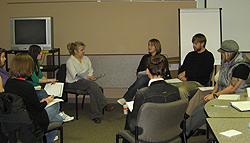Resistance Training May Improve Nerve Health, Slow Aging Process
Simple resistance training may help counteract age-related nerve deterioration that puts seniors at risk of injuries from falls and other accidents, according to cross-institutional research led by postdoctoral researcher JoCarol Shields and Department of Exercise Science Professor Jason DeFreitas. The…


 When “Strategies for Community Behavioral Health Practice” (SWK 700) debuted last August, the course’s faculty architects believed a deliberate pairing of
When “Strategies for Community Behavioral Health Practice” (SWK 700) debuted last August, the course’s faculty architects believed a deliberate pairing of